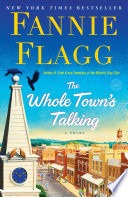Someone recommended The Whole Town’s Talking: A Novel to me because of its supernatural thread, and I enjoyed Fannie Flagg’s Fried Green Tomatoes. The Whole Town’s Talking: A Novel is about the residents of a small Missouri town from when it was founded to 2021. While The Whole Town’s Talking: A Novel is initially pleasing and rapid paced, as the novel unfolds, the introduction of characters begins to become amorphous and indistinct.
There is an underlying, passive agressive MAGA tone of the past is good, and the present is bad, crime-ridden and politically correct. When I began to compare and contrast The Whole Town’s Talking: A Novel to great American novels about prairie towns like My Antonia that did not gloss over the difficulties of the past, but used those difficulties to tell a compelling story, I began to reevaluate my initial impression of Flagg’s latest novel.
The Whole Town’s Talking: A Novel is fiction in more ways than one. The Whole Town’s Talking: A Novel is an insidious recharacterization of America’s past as a predominantly conflict-free, peaceful and noble tale filled with industrious, hard-working immigrants. For example, Flagg uses the suffragette movement as a quirky, brief amusing tale, and women use activism as a mild diversion from daily life. The men do not resist.
Even with the supernatural theme, The Whole Town’s Talking: A Novel may initially be pleasing, but don’t waste your time on this pablum. Instead check out great American classics.

The Whole Town’s Talking: A Novel
Stay In The Know
Join my mailing list to get updates about recent reviews, upcoming speaking engagements, and film news.




